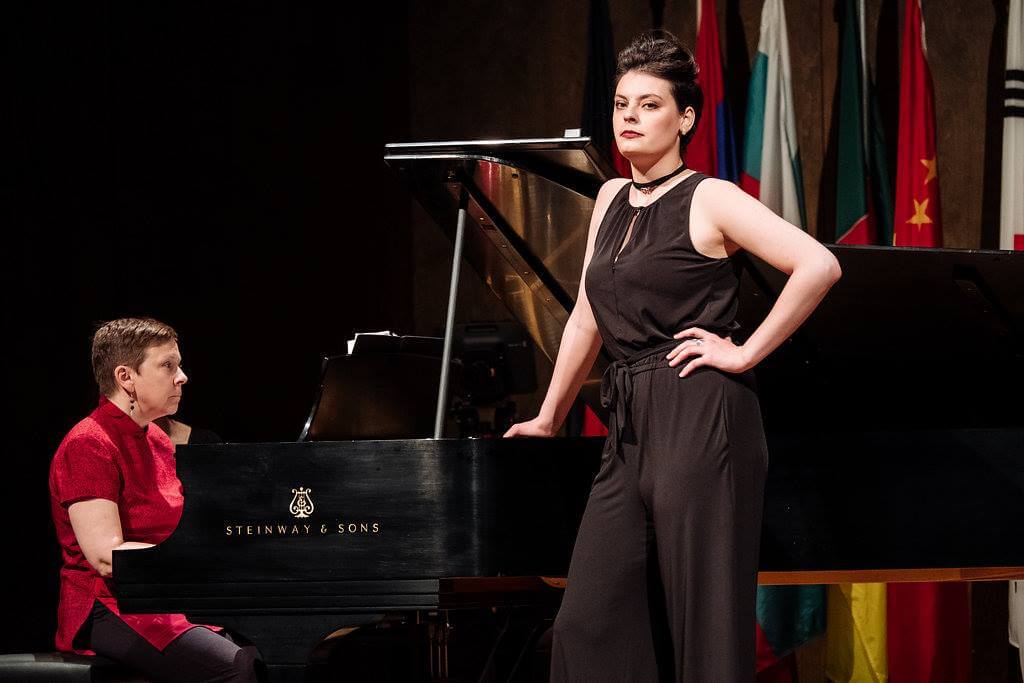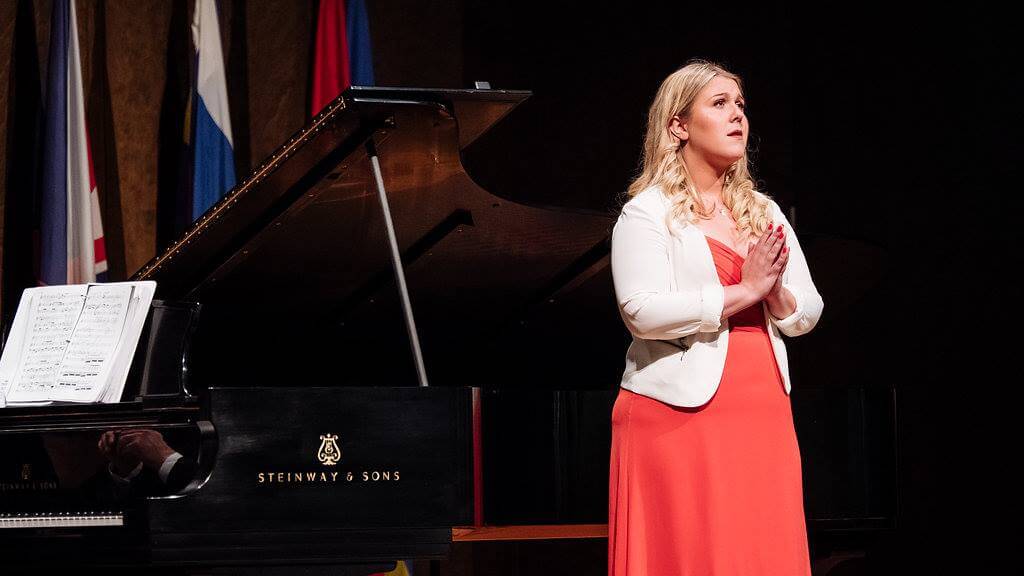
MONTRÉAL — Following the excellent Art Song First Round yesterday at the 2018 Concours musical international de Montréal (CMIM), today we had the First Round of the Aria Division, in two sessions at Salle Bourgie, featuring sixteen singers:
Session One: Carolyn Sproule (Canada), mezzo-soprano; ByeongMin Gil (South Korea), bass; Dilyara Idrisova (Russia), soprano; Kidon Choi (South Korea), baritone; Mihail Mihaylov (Bulgaria), tenor; Christina Nilsson (Sweden), soprano; ChanHee Cho (South Korea, bass; Emily D’Angelo (Canada-Italy), mezzo-soprano.
Session Two: Alexandra Yangel (Russia), mezzo-soprano; Andrew Haji (Canada), tenor; Anush Hovhannisyan (Arménia), soprano; Jongsoo Yang (South Korea), bass; Konstantin Lee (South Korea), tenor; Lauren Margison (Canada), soprano; Oleksandr Kyreiev (Ukraine), baritone; Olga Rudyk (Ukraine), soprano.
There will be a third session on Thursday evening, for a total of 24 competitors, from which 12 will move on to the semi-finals. In all honesty, the level was so high today that one easily fills the semi-finals roster with the competitors today. The jury panel will have a difficult task ahead!
The afternoon session opened with Canadian mezzo Carolyn Sproule, who recently made her COC debut as Maddalena in Rigoletto. A high mezzo, Octavian’s “Wie du warst” from Der Rosenkavalier suits her, and she sang with attractive, smooth tone, if with a touch too pronounced a vibrato, especially in the beginning. Her other pieces were Dalila’s “Printemps qui commence” and an aria from Maria Stuarda. It’s a lovely voice, smooth and evenly produced, perhaps with not ideally clear diction and sufficient variation in tone colours. Young Korean bass ByeongMin Gil followed with arias from Giulio Cesare and La sonnambula, the latter complete with cabaletta. Very well sung, if slightly dry of tone.

Up next was Russian soprano Dilyara Idrisova, singing with excellent coloratura an aria from Handel’s Hercules, followed by a Mozart concert aria and one from Vivaldi’s Bajazet. All dispatched with exemplary agility. South Korean baritone Kidon Choi sang Ford’s aria from Falstaff very dramatically. The same can be said for “Cruda fenestra smania” from Lucia, and conclude with a very dramatic aria from Mazeppa. I find him a bit over the top, while a more nuanced approach would be nice.
Good tenors are in short supply, and a voice as fine as Bulgarian tenor Mihail Mihaylov’s is rare. He sang a wonderful “Kuda, kuda,” Lensky’s aria from Eugene Onegin, followed by a clarion-toned “Che gelida manina” complete with a very good high C. He ended his program with an affecting “Pourquoi me reveiller” from Werther. To my ears, Mr. Mihaylov was the star contestant up to that point – that is until the next singer, Swedish soprano Christina Nilsson, stepped up. What a voice Nilsson has! When it’s as good as hers, it’s perfectly alright to be so audacious as to start with the daunting “O patria mia,” hardly ever done in competitions. She followed with a gorgeous “Frühling” from Vier letzte Lieder, finished with “Dich teure Halle” from Tannhauser – full marks for Ms. Nilsson!
Korean bass ChanHee Cho has a very impressive instrument, and sang La calunnia beautifully, followed by a rare choice, Alvise’s aria from La Gioconda, all dispatched with aplomb. The afternoon session ended with Canadian mezzo Emily D’Angelo, who has already won the Met Auditions two years ago, at the incredible age of 21. She keeps getting better and better. She sang three showstoppers, the Rosina aria, which is her calling card, plus a brilliant “Parto, parto,” one of the most daunting of mezzo arias. To my ears, she and Christine Nilsson are the early favourites to move onto the next round.
The evening session started off with Russian high mezzo Alexandra Yangel, singing arias by Meyerbeer, Rossini and Mozart. Her agility was excellent, to go with a very nice trill and strong theatricality, with temperament to burn. Then it was Canadian tenor Andrew Haji, who is well known to Toronto audiences. Haji won big a couple of years ago in ‘s-Hertogenbosch voice competition in Holland. Last night, he sang the short and sweet “Questa o quella” from Rigoletto, followed by an aria from Tamelano, which showed off his agility and long breath-line. He ended with his calling card and his good luck charm, “Una furtiva lagrima,” once again delivered with melting tone.
Armenian soprano Anush Hovhannisyan is a very rare dramatic coloratura. Her timbre is rich and plummy, with brilliant high notes and long breath-line. She also has a stately persona. Her choices showed off her amazing instrument — “Bel raggio lusinghier” from Semiramide, followed by Frühling, first song in Vier letzte Lieder. She ended with an aria from Mitridate, Re di Ponto, showing off her stunning fioritura. This is a voice to watch. Korean Jongsoo Yang is a budding basso cantante, possessing a very fine instrument, combined with a tall, youthful, attractive stage presence. He sang an excellent “La vendetta” from Nozze, acting to the hilt, okay, maybe somewhat over-the-top! He also sang Rocco’s “Hat mannicht auch” from Fidelio very nicely. Strangely, the bass solo from Die Schöpfung found him using the score. Even if using the music in oratorio is permitted and he didn’t really refer to it, it’s still not a great idea in a competition.
He was followed by Korean tenor Konstantin Lee, who has quite a good instrument. However, he used it in what one might call a “Verismo Overdrive” mode, too overwrought much of the time, in both Frederico’s Lament and “Dein ist mein ganzes Herz,” frankly stylistically problematic. Ukrainian baritone Oleksandr Kyreiev also has a tendency to push his voice, causing a slow vibrato to develop and distorting his arias from Manon and Iolanta. Much too hard driven all the time. Canadian soprano Lauren Margison, who is joining the COC Ensemble next season, has a beautiful full lyric soprano with gleaming tone. She sang a beautiful Jewel Song from Faust — sans trill — and a very fine Porgi amor from Nozze. The evening concluded with Ukrainian soprano Olga Rudyk in “Come scoglio” from Cosi, followed by Liu’s aria and Song to the Moon from Rusalka, all dispatched with fine technique and musicality, if not particularly distinctive tone.
There you have it — some very fine singing in both sessions. Sixteen singers, vast majority of them performed well enough to be deserving of moving on to the next round.
The third session is scheduled Thursday evening 7:30 p.m. from Salle Bourgie. Stay tuned.



